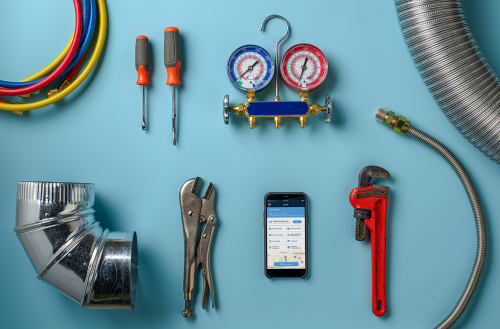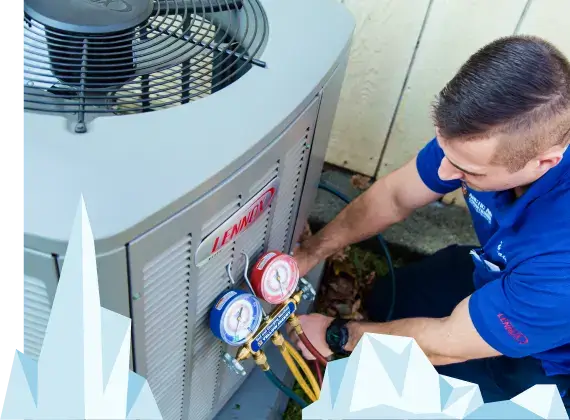Choose DMAKS HVAC for Reliable and Professional HVAC Solutions.
Choose DMAKS HVAC for Reliable and Professional HVAC Solutions.
Blog Article
Energy-Efficient HVAC Solutions to Save Money On Energy Expenses
As energy costs continue to climb, the importance of energy-efficient HVAC systems ends up being progressively evident. These systems not only assure substantial savings on utility expenses yet also add to a much more lasting future by minimizing energy consumption. With different options available, including geothermal heatpump and ductless mini-splits, home owners encounter a wide range of options that can improve convenience and air quality. Comprehending the essential functions and maintenance requirements is important to making best use of these benefits. What variables should be prioritized when choosing the appropriate system for your needs?
Advantages of Energy-Efficient Heating And Cooling Systems
Energy-efficient A/c systems supply numerous advantages that prolong beyond simple cost financial savings. By consuming much less energy, these systems contribute to reduce greenhouse gas discharges, aiding to combat climate change and advertise sustainability.
Furthermore, energy-efficient heating and cooling systems usually give enhanced comfort degrees. Many of these systems feature advanced innovation that enables better temperature control and enhanced air high quality (DMAKS HVAC). This causes a much healthier indoor atmosphere, which is especially crucial for people with allergies or breathing problems
Furthermore, buying energy-efficient HVAC systems can boost home value. As more customers focus on energy effectiveness, homes and buildings geared up with these systems may bring in higher quotes in the property market.
Kinds Of Energy-Efficient A/c Options
Exactly how can house owners and organizations select the most suitable energy-efficient HVAC choices for their requirements? The market offers a selection of energy-efficient a/c systems, each created to improve comfort while minimizing power consumption.
One alternative is the variable cooling agent circulation (VRF) system, which effectively regulates the temperature level in several zones within a structure. This system adjusts its refrigerant circulation to match the desired temperature, leading to considerable energy financial savings.
Another popular selection is geothermal heatpump, which utilize the planet's stable temperature level to warm and amazing rooms. By transferring warmth to and from the ground, these systems demonstrate outstanding performance, particularly in modest climates.
Furthermore, ductless mini-split systems offer an energy-efficient choice for homes doing not have ductwork. These systems enable for zone-specific home heating and air conditioning, decreasing power waste in unoccupied areas.
Lastly, high-efficiency heating systems and air conditioners, with sophisticated SEER and AFUE rankings, offer trusted environment control while taking in much less power than conventional designs. By reviewing these alternatives, property owners and services can pick a heating and cooling system customized to their certain needs and energy effectiveness objectives.
Trick Attributes to Consider

Following, examine the sort of compressor made use of in the system. DMAKS HVAC. Variable-speed compressors can adjust their result to match the heating or cooling down demand, causing improved convenience and energy financial savings compared to single-speed versions. Additionally, seek systems geared up with clever thermostats that provide programmable settings and remote access, enabling better control over energy intake
One more important attribute is the system's air purification capacity. High-efficiency filters can boost interior air quality and decrease energy consumption by making sure the system operates efficiently. Additionally, think about the sort of refrigerant used; modern systems commonly utilize environmentally friendly cooling agents that have a reduced ecological effect.
Lastly, ensure that the system is suitable with zoning technology, which permits for tailored temperature control in different locations of your home, enhancing comfort while minimizing power usage.
Tips for Choosing the Right System


Next, take into consideration power efficiency ratings, particularly the Seasonal Power Effectiveness Ratio (SEER) for cooling systems and the Annual Fuel Utilization Performance (AFUE) for home heating systems. Higher ratings suggest greater performance, which can cause significant advice savings on utility bills over time.
In addition, assess the kind of HVAC system that finest matches your way of living and budget plan. Options consist of air conditioning, ductless mini-splits, and heatpump, each with its very own set of benefits and drawbacks.
Do not overlook the relevance of appropriate installment and sizing; an improperly sized system can lead to inadequacies and raised wear. Consult with a specialist Heating and cooling contractor to acquire experienced recommendations customized to your home's one-of-a-kind requirements. This thorough approach will make certain that you select an energy-efficient HVAC system that fulfills your needs and budget successfully.
Upkeep for Optimum Efficiency
As soon as the best cooling and heating system is in location, recurring upkeep becomes vital to making certain ideal efficiency and longevity. A well-maintained system runs extra properly, leading to lower energy intake and reduced utility costs. Normal examinations and tune-ups should be arranged at least two times a year-- when prior to the cooling period and once before the home heating period.

Property owners ought to additionally be alert about monitoring their HVAC system's performance. Unusual noises, rising and fall temperature levels, or raised power expenses can recommended you read indicate underlying concerns that require immediate attention. By addressing these concerns quickly, house owners can stop expensive fixings and prolong the life expectancy of their systems.
Investing in an upkeep strategy with a certified service technician not just boosts efficiency however likewise gives peace of mind, knowing that the system is running at its best. DMAKS HVAC. Routine upkeep is therefore important for maintaining power performance and lowering total functional prices
Conclusion
To conclude, energy-efficient heating and cooling systems provide a sensible service for reducing utility expenses while boosting comfort and air top quality. By including advanced innovations and alternatives such as geothermal warmth pumps and ductless mini-splits, home owners can achieve considerable power savings and contribute to environmental sustainability. Cautious consideration of system attributes and recurring upkeep further ensures optimum efficiency, making energy-efficient systems a prudent investment for both economic and ecological advantages.
Report this page